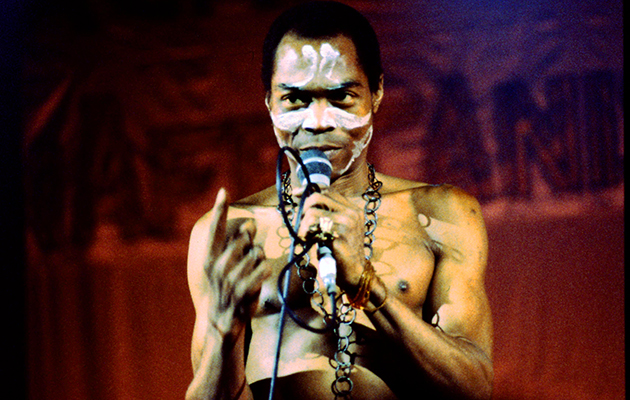Fela and his entourage moved into exile in Ghana, but soon found themselves expelled and returned to Nigeria, where Fela planned to start his own party and run for President. The funds were going to come via a lucrative gig at the 1979 Berlin Jazz Festival, a rumour that prompted the defection of most of his band, including Tony Allen. “I couldn’t stand the bullshit anymore,” says the drummer today. “I couldn’t stand the hangers-on, the politics, the violence – I’m a musician, I didn’t sign up for that.”
Fela recruited a new band and more insurrectionary LPs followed – 1980’s Coffin For Head Of State and ITT (International Thief Thief). He also turned his attentions to an international audience, although the logistics of moving a huge entourage around the world proved problematic.
“There were between 30 and 70 people at any one time,” says Rikki Stein, who co-managed Fela from the early ’80s onwards. “Fela was banned from every major hotel in Europe. It was partly the aftershow parties, the weed, people naked in the corridors, but they’d forget they’d left baths running, they’d iron clothes on expensive bedspreads. Fela would show up in the lobby of a five-star hotel wearing nothing but his habitual Speedos. Still, we never missed a plane. I’m proud of that. Fela was a hard taskmaster but he had to be, they were such a bunch of ragamuffins. He would fine people wages – ‘Two days motherfucker!’ – he called it his Ice Cream Fund. He wasn’t a great payer, though he could also be very generous.”
Fela’s international reputation led to an offer of a $1m deal with Motown, who were setting up an African division, a deal Fela delayed until the spring of 1985 “because my spirits told me so”. A month before he was due to sign, Motown’s hierarchy changed and the deal was scapped. “Maybe the spirits knew something,” reflects Stein.
A more serious blow came when Fela was busted on currency-smuggling charges on the eve of a 1984 tour. “I’d taken out £3,000 for him in London,” says Stein, “which he declared in Nigeria, but when he left they denied he’d done so. It was a conspiracy, they wanted him.”
Fela served 20 months of a five-year sentence, his plight as ‘a political prisoner’ championed by Amnesty, though his release owed more to internal Nigerian politics. The records continued to arrive, though Fela’s refusal to play any of his hits drove record companies to distraction. “Once he’d recorded something he’d never play it live,” explains Stein. “He’d develop a song at rehearsals at The Shrine in front of the faithful and record it once he got tired of it.”
The Nigerian authorities continued with their persecution and in 1993 the singer was accused of murder and received a beating so severe that Fela himself thought it was a death sentence. “He was in pain a lot of the time,” reckons Stein. “He used to have to line up his body in order to play the sax.”


